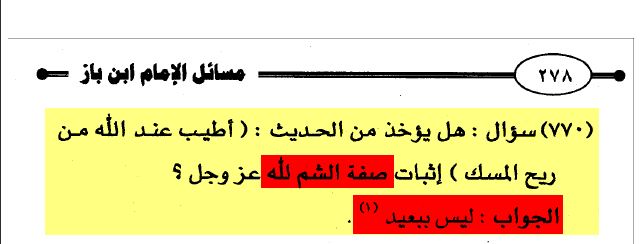‘Salafi’ theologian Ibn Baz states:
جاء في كتاب مسائل الامام ابن باز: ص 278 رقم [ 770 ]، الطبعة الأولى 1428هـ.
(( سؤال: هل يؤخذ من الحديث: ( أطيب عند الله من ريح المسك ) إثبات صفة الشم لله عز وجل؟
الجواب: ليس ببعيد.))
Scan:

Rough translation:
Questions and answers by Shaykh Ibn Baz, page 278 No. 770, first edition 1428 H:
Question: Can it be understood from the hadeeth “the smell from the mouth of the fasting person is more fragrant to Allah than the smell of musk” that we can attribute to Allah the attribute of smell?
Answer: This is not far-fetched [laysa bi ba’eed]

Pingback: Ta’wil of Saaq and al-Kursi | Rasool ur-Rahmah (The Messenger of Mercy)
So explain the hadeeth then… does Allah not smell?
LikeLike
“By Him in Whose Hand the soul of Muḥammad is, the breath of one fasting is purer/finer to Allāh than the fragrance of musk”
The hand of Allāh here means His power. The Nabī ﷺ swore to emphasize his statement, and the ʿulamāʾ consider this evidence for the desirability of swearing to draw the attention of the listener to a matter of importance.
The breath means the undesirable odor caused by fasting. This is understood from the ḥadīth ‘My Umma has been given five things in Ramaḍān….and the second thing is that their breath in the afternoon is finer than the smell of musk’. This same ḥadīth is also used as evidence that it is the breath in this world which is meant, as explained by Ibn-Ṣalāḥ and the majority of the ʿulamāʾ.
The mention of musk is the subject of different interpretations from the ʿulamāʾ:
Al-Māzirī explains: it is a metaphor to signify how close fasting brings one to Allāh-Taʿālā, as it is common for us to have pleasant smells close to us. Fasting is therefore likened to musk for the same reason, due to how it brings one to Allāh’s proximity. In other words it is purer in the eyes of Allāh than musk is to your eyes, it brings one closer to Allāh than you would bring musk close to you. Ibn ʿAbdul-Barr has preferred this interpretation.
It is also said: it means that what you think of the smell and what it is like of musk to Allāh is in opposition with your view as human beings. This interpretation is very similar to the previous one.
It is also said: the meaning is that Allāh will reward the one fasting in the hereafter and the smell of their breath will be finer than that of musk, as will be mentioned further ‘And the smell of his wound will diffuse musk’.
It is also said: the meaning is that the person will attain a reward which is superior to the smell of musk, especially in comparison to the smell of one’s breath. Both of these last two interpretations were related by Al-Qāḍī ʿIyāḍ.
Al-Dāwūdī and a group of ʿulamāʾ have said the following: it means that the smell of the breadth has more reward than musk which is considered praiseworthy in jumuʿa and in gatherings of the remembrance of Allāh. Imām Al-Nawawī favored this interpretation.
The gist of the matter is that the meaning of perfume is to be taken as a metaphor signifying acceptance and contentment from Allāh, since the feeling of scent is inconceivable in association with the being of Allāh.
Al-Qāḍī Ḥusayn has narrated that acts of obedience will diffuse a smell on the Day of Judgment, and the smell of fasting among those acts will be that of musk.
Taken from the ‘salafi’ website
https://muslimmatters.org/2020/05/15/ibn-ʿallans-commentary-dalilul-falihin-the-book-of-fasting-hadiths-1-2/
LikeLike